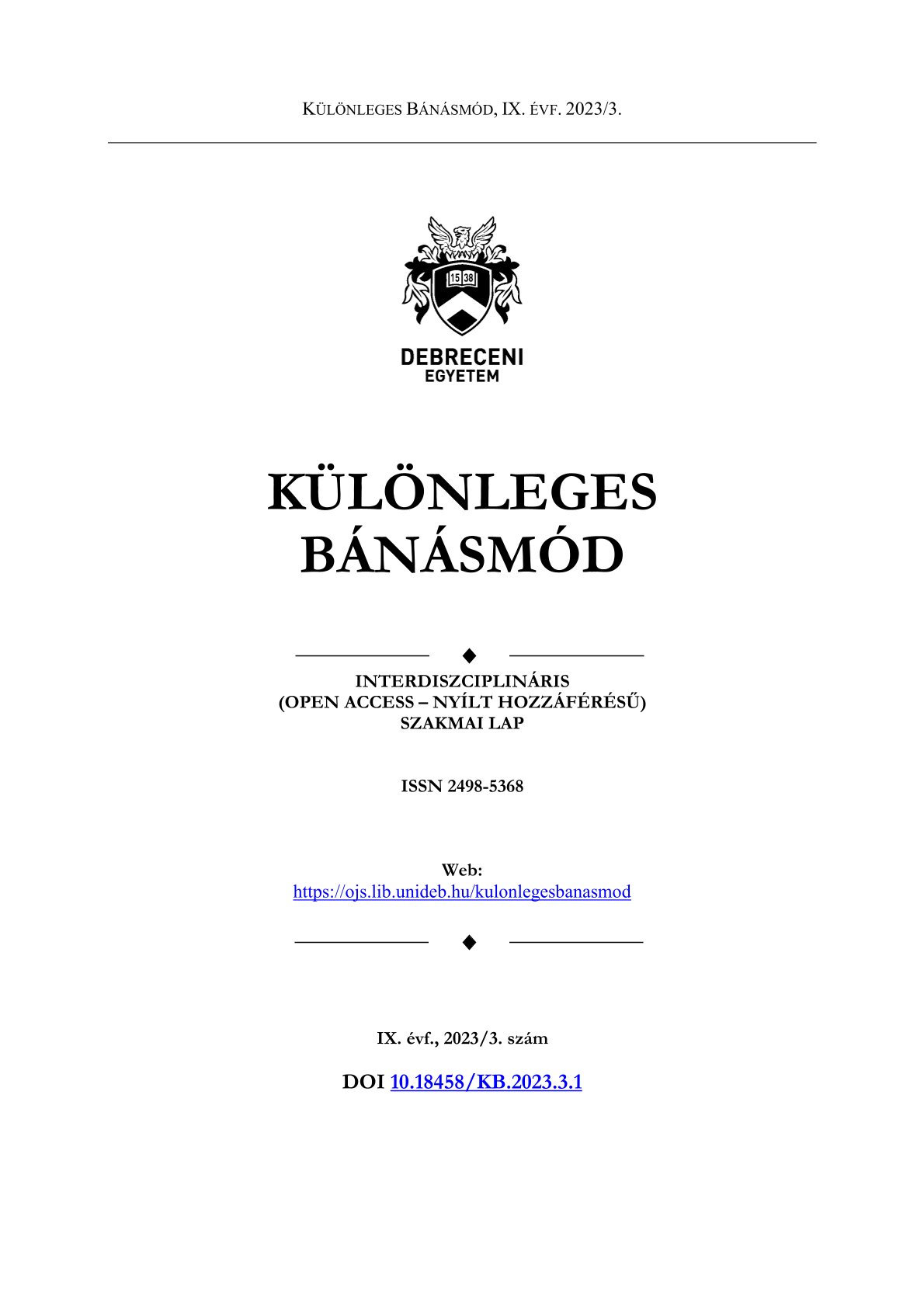THE EXPERIENCES OF PHYSIOTHERAPY IN PRESCHOOLS IN THE LIGHT OF A KINDERGARTEN RESEARCH IN HAJDÚBÖSZÖRMÉNY
Authors
View
Keywords
License
Copyright (c) 2023 Kinczel Antónia, Fülöp-Pipó Mariann, Pálinkás Réka, Peter Židek (PeadDr.), Laoues-Czimbalmos Nóra, Dr. Lengyel Attila , Dr. Müller Anetta

This work is licensed under a Creative Commons Attribution-NonCommercial-NoDerivatives 4.0 International License.
How To Cite
Abstract
The literature and research on physiotherapy in Hungary are not as complete as the research on physical education, so this article is also incomplete. Our research aimed to report on the experiences of physiotherapy sessions for preschool children within the physical education sector, as this area is less researched. Our research presents the experiences of children and their parents who have participated in pre-school physiotherapy in a sample of children attending the Good Shepherd Reformed Kindergarten in Hajdúböszörmény. The results are presented based on the analysis of a questionnaire filled in by 50 parents and an interview with the physiotherapy teacher who teaches in the kindergarten. The survey shows that 8% of parents of preschool children did not know that their child was attending such sessions, 92% of parents were informed, but 20% did not know how many development sessions their child was attending. The majority of parents follow up on their child's development, but consider the information provided by the teacher to be insufficient. The vast majority of parents were also aware of their child's diagnosis. Parents' opinions showed that they consider the existence of physiotherapy sessions important, as they consider it essential for the effective development of a growing organism. Parents also noted positive effects of physiotherapy sessions, such as improved posture, flexibility, reduced orthopaedic deformities, increased endurance, or improved dexterity and hand-foot coordination. Another important aspect, according to parents, is that these sessions are free of charge, take place during nursery school hours and they are playful. According to the physiotherapy teacher, the number of sessions is not sufficient to achieve optimal improvement, given that the vast majority of children only receive development in kindergarten. These results are useful and can be used in the training of kindergarten teachers or further training courses.
References
- Andrásné Teleki J. (2000). A testnevelés szervezeti keretei között megoldható prevenció és korrek-ció közigazgatási szabályozása (pp 7-11). In Gaál Sné., Bencze Sné (szerk.). Prevenció és korrekció a 3-10 éves korú gyermekek testnevelésében. Tessedik Sámuel Főiskola, Kőrős Főiskolai Kara, Szarvas.
- Andrásné Teleki, J. (2017). A gyógytestnevelés feladata, jelenlegi helyzete az oktatás rendszerében Testnevelés, Sport, Tudomány., 2. (1-2.). DOI 10.21846/TST.2017.1-2
- Fülöp-Pipó M. (2023). A hajdúböszörményi Jó Pásztor Református Óvoda gyógytestnevelési fejlesztésben részesülő óvodáskorú gyermekek szüleinek és a velük foglalkozó gyógytestnevelő tanár véleményének illetve tapasztalatainak összehasonlítása. Szakdolgozat. Debreceni Egyetem, Gyermeknevelési és Gyógypedagógiai Kar.
- Gaál S. & Bencze S (2004). A testnevelés mozgás-anyagának feldolgozása a 3-10 éves korosztály számára. Gaál Sándorné – Magánkiadás.
- Hidvégi, P. & Müller, A. (2015). Gyógytestnevelés. EKF Líceum Kiadó, Eger.
- Mező, K. (2018). A kora gyermekkori családi nevelés hatása az érzelmi intelligencia kialakulására és fejlődésére. In: Vargáné, Nagy Anikó (szerk.) Családi nevelés 3. Debrecen, Magyarország : Didakt. 43-59.
- Mező, K. (2022). Peculiarities in Teaching Students with Learning Disabilities and the Learning Support Mechanism of Educators during the COVID-19 Pandemic. Fogyatékosság és Társadalom. 16-24. DOI 10.31287/FT.en.2022.2.3
- Mező, F. & Mező, K. (2022). Kreativitás a sport terén. Tehetség 2022/ 1. 5-8.
- Mező, K. (2022). Opportunities for collaboration between families and talent organizations for developing the creativity of sports talent. In: Gortka-Rákó, E.; Godawa, G. (szerk.) Education in the FamilyFamily in Education II. Krakow, Lengyelország: Pontifical University of John Paul II in Krakow, Institute of Pedagogy and Family Sciences, Faculty of Education for Children and Special Educational Needs of the University of Debrecen. p. 15
- Müller, A.; Laoues-Czimbalmos, N.; Szerdahelyi, Z.; Boda, E.; & Mező, K. (2021). Gyógypedagógiai mozgásfejlesztés szerepe és módszertani aspektusai. Különleges Bánásmód 7(3). 101-112. DOI 10.18458/KB.2021.3.101
- Őry, E.,Kajtár, G., & Simon, I. Á. (2019): Gyógytestnevelők motivációja a továbbkép-zések terén. Képzés és Gyakorlat: Training and Practice 17(3-4). 87-96.
- Pálfi, S., Rákó E., Vargané Nagy A., Teszenyi E. (2020): Children’s rights in Hungary in early childhood education and care In: Jane, Murray; Beth, Blue Swadener; Kylie, Smith (eds.) The-Routledge-International-Handbook-of-Young-Childrens-Rights. London, Routledge of Taylor and Francis Group. 354-365.
- Pálfi, S. (2019). Az óvodai játék a gyermekközpontúság mutatója: az óvodai játék jelene - és amilyen lehetne. Budapest, Sprint Kft.
- Ramocsa, G. (2005): A gerincferdülés: Scoliosis. In: Csendes, Krisztina (szerk.) Kisgyermekek, nagy problémák: 4-9 éves gyermekeket nevelő pedagógusok kézikönyve. Budapest, Raabe Kiadó.
- Ramocsa, G. (2009): A játék komplex értelmezése és alkalmazása a napjaink gyógytestnevelésében. 39. Mozgásbiológiai Konferencia : Program. Előadás-kivonatok. 33-34.
- Simon, I. Á. & Kajtár, G. (2015): A gyógytestnevelő tanár nevelői, szakmai attitűdje. Magyar Sporttudományi Szemle 16: 2(62). 60.
- Simon, I. Á. (2022b): A játék szerepe a kisgyer-mekek testnevelésében (mozgásos tevékenységében). In: Simon, I. (szerk.) A játék kisgyermekkorban: Szemelvények a játék különböző területeiről. Sopron, Magyarország: Soproni Egyetemi Kiadó. 130-184.
- Wolf, K. (2022): Mozgás és mozgásfejlesztés az óvodában. Módszertani Közlemények, 62(2), 96–102.
- Vargáné, Nagy A. (2021). A SARS COVID-19 okozta helyzet a hazai kora gyermekkori intézményekben. Különleges Bánásmód 7: 4. 101-107. DOI 10.18458/KB.2021.4.101
- Vargáné, Nagy A; Pálfi, S. (szerk.).Játékkal a világ körül = Play around the world. Debrecen, Debreceni Egyetemi Kiadó.
- Višnjić-Jevtić, A., Varga Nagy, A., Ozturk, G., Şahin-Sak, İkbal T., Paz-Albo, J., Toran, M. i Sánchez-Pérez, N. (2021). Policies and practices of early childhood education and care during the COVID-19 pandemic: Perspectives from five countries. Journal of Childhood, Education & Society, 2(2), 200–216. DOI 10.37291/2717638X.202122114


 https://doi.org/10.18458/KB.2023.3.27
https://doi.org/10.18458/KB.2023.3.27